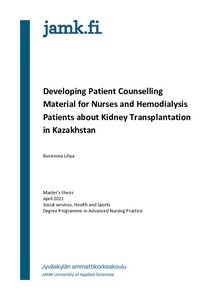Developing Patient Counselling Material for Nurses and Hemodialysis Patients about Kidney Transplantation in Kazakhstan
Russinova, Liliya (2021)
Russinova, Liliya
2021
All rights reserved. This publication is copyrighted. You may download, display and print it for Your own personal use. Commercial use is prohibited.
Julkaisun pysyvä osoite on
https://urn.fi/URN:NBN:fi:amk-202104306447
https://urn.fi/URN:NBN:fi:amk-202104306447
Tiivistelmä
Introduction: Kidney transplantation in Kazakhstan is currently provided in an insufficient volume, which does not allow providing all patients in need. A significant number of the working-age population are on hemodialysis, losing their health and ability to work instead of living productively. The healthcare personnel of hemodialysis units are often the only transplantation information resource for hemodialysis patients.
Objective and tasks: Developing counselling material for nurses and hemodialysis patients about kidney transplantation in Kazakhstan in order to increase awareness and knowledge of kidney transplantation. The tasks of this development work were: 1) to assess the knowledge base for kidney transplantation of Kazakh nurses, who work in the hemodialysis departments, and hemodialysis patients using the selected knowledge test; 2) to develop counselling video about kidney transplantation for dialysis nurses and material for patients in order to reach purpose, and 3) to make a plan of dissemination of the counselling video in the future.
Methodology: This development work was conducted from December 2019 to March 2021. The knowledge of nurses (n = 43) and patients (n = 18) of hemodialysis departments in Kazakhstan was tested. Based on the result of the knowledge test and international study results, a counselling video was created for nurses and hemodialysis patients.
Results: The product of this development work is a counselling video for nurses and hemodialysis patients about kidney transplantation in Kazakhstan to increase nurses’ and hemodialysis patients’ awareness of kidney transplantation. The assumption at the beginning of the development work that the patients’ knowledge is comparable to that of the nurses’ was confirmed, therefore, the created counselling material remains relevant for both groups of respondents. To transfer evidence-based knowledge into evidence-based practice, a dissemination plan was created for the counselling video in local and international levels.
Conclusion: Further investigation is needed to study this issue in all regions of Kazakhstan at a more extensive level. It is also necessary to create educational materials in different languages in order to increase the awareness of patients and their relatives in need of training.
Objective and tasks: Developing counselling material for nurses and hemodialysis patients about kidney transplantation in Kazakhstan in order to increase awareness and knowledge of kidney transplantation. The tasks of this development work were: 1) to assess the knowledge base for kidney transplantation of Kazakh nurses, who work in the hemodialysis departments, and hemodialysis patients using the selected knowledge test; 2) to develop counselling video about kidney transplantation for dialysis nurses and material for patients in order to reach purpose, and 3) to make a plan of dissemination of the counselling video in the future.
Methodology: This development work was conducted from December 2019 to March 2021. The knowledge of nurses (n = 43) and patients (n = 18) of hemodialysis departments in Kazakhstan was tested. Based on the result of the knowledge test and international study results, a counselling video was created for nurses and hemodialysis patients.
Results: The product of this development work is a counselling video for nurses and hemodialysis patients about kidney transplantation in Kazakhstan to increase nurses’ and hemodialysis patients’ awareness of kidney transplantation. The assumption at the beginning of the development work that the patients’ knowledge is comparable to that of the nurses’ was confirmed, therefore, the created counselling material remains relevant for both groups of respondents. To transfer evidence-based knowledge into evidence-based practice, a dissemination plan was created for the counselling video in local and international levels.
Conclusion: Further investigation is needed to study this issue in all regions of Kazakhstan at a more extensive level. It is also necessary to create educational materials in different languages in order to increase the awareness of patients and their relatives in need of training.
